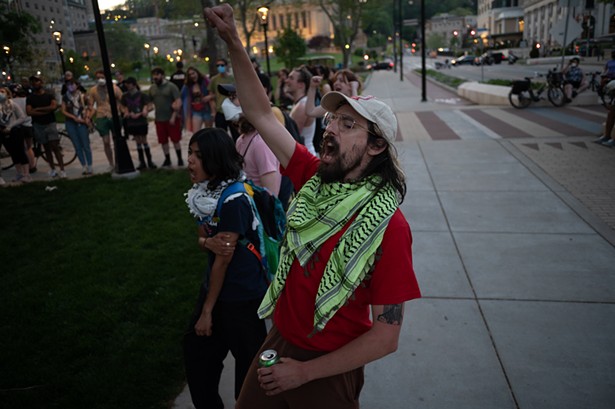Organizers of G-20 protests say a possible new law against bringing such things as PVC pipe, locks or cement Downtown as protest tools during the international summit misses the mark. Instead, the ban may harm makers of less provocative forms of protest, from large signs to colorful puppets.
As the Pittsburgh Post-Gazette reported on Aug. 7, the law is being drafted by Mayor Luke Ravenstahl's administration. It would target protester lockboxes -- plastic or steel pipes covered with hardening substances to shield activists' arms hooked or locked inside.
But members of the Pittsburgh Organizing Group, who recently offered training in lockdown methods among its many pre-G-20 classes, said such devices are unlikely to be used, or useful, in protesting the Sept. 24-25 international summit, which will see heavy security surrounding the David L. Lawrence Convention Center.
"These things are huge, pretty heavy and incredibly conspicuous," noted trainer Chris Bohr at the July class.
"I can't speak to anybody's plans," added fellow trainer Patrick Young, "but it seems like lockboxes and lockdown devices are not something we're going to see at G-20.
"There are many, many more less-common [tactics] that are out there and there are ones that haven't been thought of yet," he told the small group gathered in Garfield. "You're going to come up with new tactics ..."
Asks POG organizer Alex Bradley, "Where does that slippery slope end, if the ends of 'stopping' protesters justify [the] means of making possession of common protest items illegal?" He contends such laws push protesters away from passive techniques like lockdowns or the construction of large, shielding banners that might appeal to greater numbers of participants.
Depending on what is banned, the Ravenstahl administration might also effectively prevent protesters from constructing mammoth, TV-friendly signs or carrying camera-friendly puppets, Bradley adds.
"There's no constitutional right to carry around a pipe," says Vic Walczak, the ACLU of Pennsylvania's Legal Director. "Those are tools that can be regulated. The devil may be in the details" of the law, which is not yet public.
The mayor's office did not respond to a request for comment.
"If they write it in a way that restricts expressive activities, it may be unconstitutional," Walczak contends. "And if this thing passes, is it then used as an excuse to search people inappropriately?"
The possible law, concludes Bradley, "is one of the things that generally starts protesters down a road of distrusting the political process ... as you realize the law is not some sacred, inviolable thing created to keep the public safe, but rather has a political context and serves the political interests of the powerful. They keep saying we should stay within the confines of the law, yet they move the goalposts of what that is."














